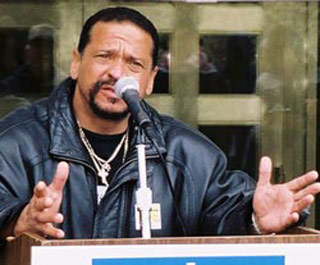
A few months ago, we wrote a post asking “After Todd Wilingham and Sharon Keller debacles, where are the Democratic candidates challenging members of the Court of Criminal Appeals?” The CCA allowed an innocent person to be executed – Todd Willingham. It is the all-Republican court that one of its own current members says became a national laughingstock years before Sharon Keller said “we close at 5”. Keller, its presiding judge, is charged with incompetence and misconduct and could be removed from office before she faces re-election in 2012.
The three incumbents on the CCA up for re-election in 2010 are: Lawrence Meyers, Michael Keasler and Cheryl Johnson. At least one of those three judges will receive a strong challenger in next year’s election. Keith Hampton, who was the lawyer who convinced the Texas Board of Pardons and Paroles and Governor Perry to commute the death sentence of Kenneth Foster, Jr to life in prison, is running for Place 6 on the Texas Court of Criminal Appeals. The seat is currently held by Michael Keasler, one of the most conservative members of the court. Grits for Breakfast has said, “There is no liberal wing on the Texas Court of Criminal Appeals. There’s a conservative wing, to which Judge Johnson belongs, and a more or less totalitarian wing, in which Keasler and Meyers reside along with Presiding Judge Sharon Keller.”
You can visit Hampton’s website at http://www.hamptonforjudge.com.
Hampton’s prospects will largely depend on the closeness of the gubernatorial contest. We have not seen a well-qualified Democrat running a strong race for the Court of Criminal Appeals in many years. The currently all-Republican CCA has become so discredited that Hampton will be able to campaign that he will bring a measure of much-needed integrity and professionalism to the court. He stands a good chance of winning. At a time when many people in Texas are concerned that the justice system is inadequately protecting innocent people from being wrongfully convicted and even executed, we need Keith Hampton on the Court of Criminal Appeals in order to restore integrity and public confidence in an institution that has become a national laughingstock.
His website says that
If elected, Keith Hampton will be the only judge who has handled death penalty cases in all stages of litigation – from accusation, trial, appeal and all post-conviction proceedings, including appearing before the Supreme Court of the United States.
Growing up in Texas, a life-long Democrat, Keith Hampton began his career at age 17, as the youngest precinct chairperson for the Texas Democratic Party.
For the last twenty years, Keith has defended the Texas Constitution and the Constitution of the United States in hundreds of cases. As an active member of the criminal defense bar, a Fellow of the Texas Bar Foundation, and a member of the Pro Bono College of the State Bar of Texas, Keith has tirelessly worked for fairness, integrity and justice for all Texans.
A Celebrated Career
1989 – J.D., St. Mary’s University1989-90 – Briefing Attorney, Judge Sam Houston Clinton
1995-2005 – Legislative Director for the Texas Criminal Defense Lawyers Association
1991 – present – Author/Speaker/Course Director, Texas Criminal Defense Lawyers Association
2008 – Percy Foreman Lawyer of the Year
2003-2009 – Texas Monthly “Super Lawyer”
Winner of the Texas Criminal Defense Lawyers Association President’s Awards for 7 straight years
Now, we need other Democrats to step up and run for the other seats on the CCA, especially the seat currently held by Lawrence Meyers.
Meyers made a laughable, dishonest claim that the CCA has a reputation for fairness in his re-election annoucement. “I am seeking re-election to the Court to continue to be an objective voice and ensure that we maintain our reputation for delivering fair and just opinions,” said Meyers in announcing his candidacy for re-election. Tell that to the family of Todd Willingham, whose last appeal based on actual innocence was denied on the day he was executed, “We have reviewed the subsequent application for habeas relief and find that it does not meet the requirements for consideration under Texas Code of Criminal Procedure, Article 11.071, § 5 as a claim of newly discovered evidence of actual innocence.”
The Dallas Morning News blog said “try not to laugh” at Meyers’ claim that the CCA has a reputation for fairness. Meyers deserves an opponent.











